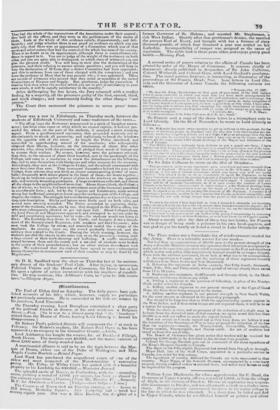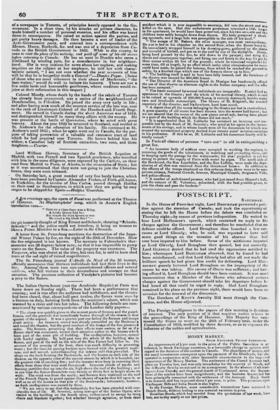William Lyon Mackenzie, for whose apprehension Sir F. Head, the
Governor of Lipper Canada, offers u reward of IA01., is from the village of Alyth, in the vicinity of Dundee. He Was an apprentice to a respect- able ironmonger in Dundee, and was afterwards a clerk to a timber-mer- chant. Ile subsequently commenced busine-s in his native village in the line in which he was educated. In a short time he failed and fled to Upper Canada, where be established himself as printer and editor of a newspaper in Toronto, of principles keenly opposed to the Go- vernment. In a short time, by his attacks on private character, be made himself a number of personal enemies, and his office was burnt down in consequence. He raised an action against the parties, and got pretty heavy damages. He then became a sort of leader of the Anti-Government party, and entered into a correspondence with Messrs. Hume, Roebuck, &c. and was one of a deputation from Ca- nada to the British Government in 1835. While in this country, he came to visit the place of his nativity, and paid o.tf some of his old scores before returning to Canada. He has an aunt in Dundee who earns a livelihood by winding yarn, for a manufacturer in her neighbour- hood. She is very anxious for news about her nephew, and making inquiries on the subject at her employer, he told her with charac- teristic naivete, " I am not sure whether the next accounts of him will be that he is hanged:or made a General!"—Dundee Paper. [ Some of those who are most vehement in their abuse of Mackenzie, " the base traitor," would do well to imitate his honesty. There are not a few noble lords and honourable gentlemen, whose creditors would re- joice at their reformation in this respect.]
Colonel Moody, whose death by the bands of the rebels of Toronto has already been announced, was a native of the ueighbourhood of Dumfermline, in Fifesbire. He joined the army very early in life ; and after having sees much of the severest service of the late war, rose to the rank of Lieutenant-Colonel of the Hundred-and-Fourth Regi- meat. He served in Canada during the short American war of 1814, and distinguished himself in many sharp affairs with the enemy. He was present at the battle of Queenston, where he acted with great bravery. About the year 1822 he returned to Scotland, and resided at St. Andrew's for the education of his family. He continued at St. Andrew's until 1835; when he again went out to Canada, for the pur- pose of taking possession of a valuable and extensive tract of land which he had acquired near Toronto. He leaves behind him his widow, a Canadian lady of Scottish extraction, two sons, and three daughters.—Courier.



























 Previous page
Previous page